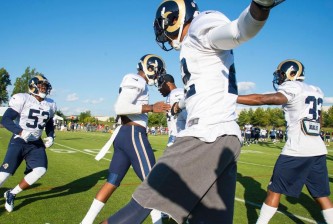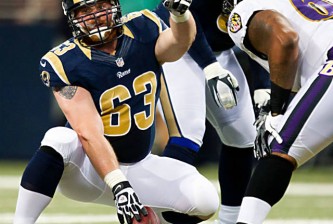Robert Quinn’s football career has been a true test of character.
It began after he was diagnosed with a serious brain tumor while in high school after suffering severe headaches and blackouts. He underwent serious surgery in his senior season after doctors said he should have been brain dead.
“When I looked at my mom when they told me I wouldn’t play sports again, I became that big old baby and busted out in tears,” Quinn told USA Today reporter Jim Corbett.
“It was just heartbreaking but it didn’t slow me down and I’m still going.”
Despite his brush with death, he posted five sacks, 54 tackles, 10 tackles for loss and 21 quarterback hurries. He finished his high school career as the 18th rated defensive end by Rivals.com and the 11th rated defensive end by ESPN.com.
He accepted a scholarship offer from North Carolina, posting a monster 11 sack campaign as a sophomore that earned him first-team all-ACC honors and second-team all-American honors.
However, entering his junior year as a Tar Heel, he was suspended for the entire 2010 season after reportedly receiving improper benefits from an agent. He was declared permanently ineligible after an NCAA investigation deemed he received travel accommodations and jewelry, then lied about it to officials three separate times.
Quinn was apologetic at the NFL combine for the harm he caused to his teammates following the reported NCAA infractions.
“I made a selfish mistake that me and my team, my family and coaches paid a price for,” Quinn said.
“God gave me a talent, and in a second, he can take it away from me.”
Despite his collegiate transgressions, Nancy Butters can attest to Quinn’s character.
She met the young defensive end while working in the hospital where he was treated for his brain tumor, according to a story from the St. Louis Post-Dispatch.
After working closely with Quinn during his recovery, she asked him to return two years later to Duke University’s Preston Robert Tisch Brain Tumor Center to comfort Lavelle Sloan.
Sloan was a high school halfback who faced the same harrowing odds and brain tumor Quinn once faced.
Quinn went beyond a simple visit, inviting Sloan to the Miami-North Carolina game in Nov. 2009, where he was allowed to walk on the field before the game and meet the defensive end and several of his teammates.
Quinn, who was only 19 himself, visited the 18-year-old frequently during his chemotherapy, offering words of encouragement and an autographed picture to keep Sloan’s spirits up.
“We talked football. We talked about life. We talked about the tumor. I told him he was going to make it through. I told him the doctor told me I was supposed to be brain dead, so I’m living testimony that it can happen,” Quinn told Post-Dispatch reporter Bryan Burwell.
“I didn’t want to go in there and tell him something negative no matter how serious his condition was. I wanted to give him hope. I had to give him hope, because at times like that, that’s all you have to cling to.”
Sloan died in April 2010, but his mother and Butters attest that Quinn’s kindness and presence helped him fight through, and most importantly, gave him hope that he could play football again.
“Meeting Robert was the highlight of the last 12 months of Lavelle’s life,” Butters said. “If you saw what he did with Lavelle and how much time he spent with him and how much he cared for Lavelle when he really didn’t have to, you would understand why I feel the way I do. To me Robert was an angel.”























